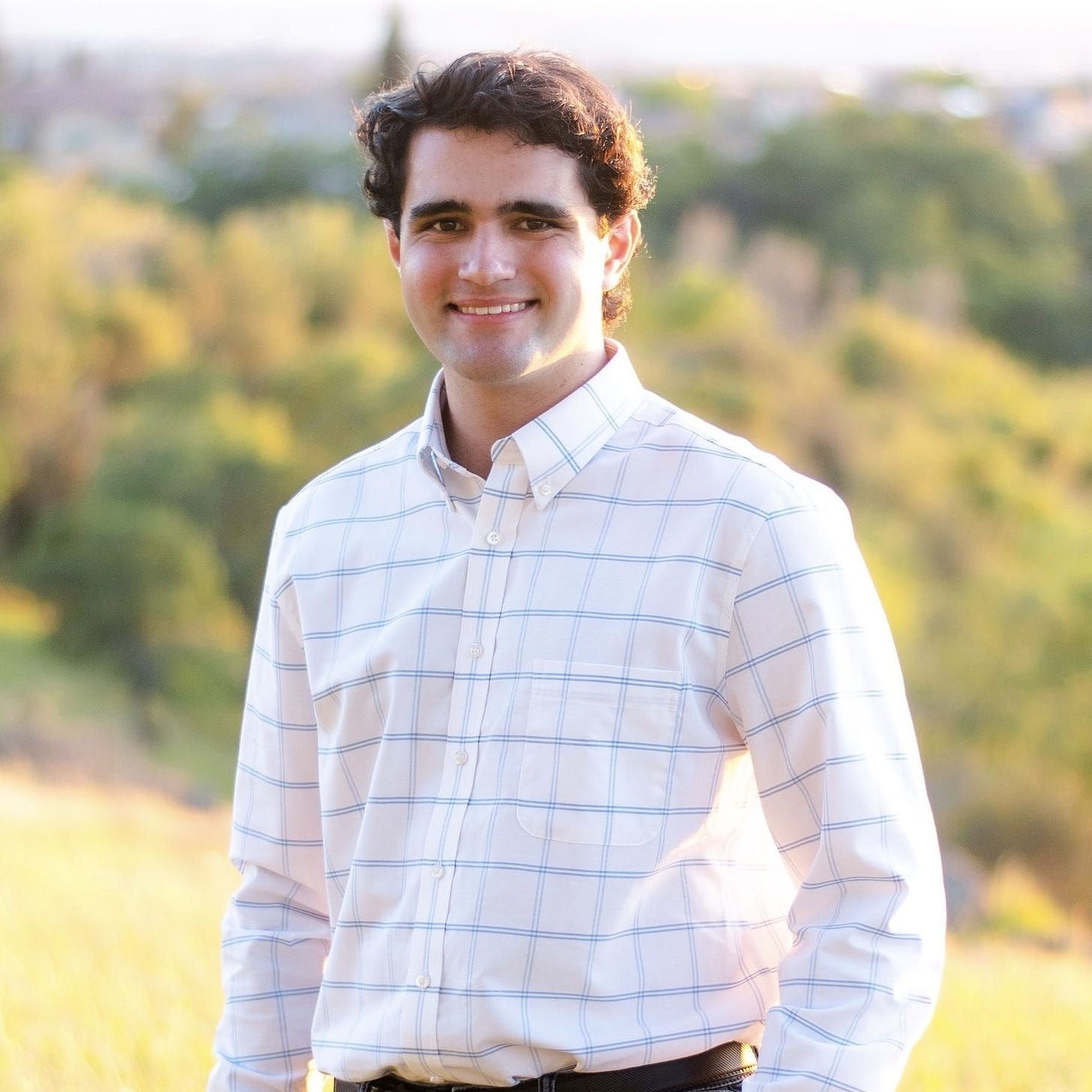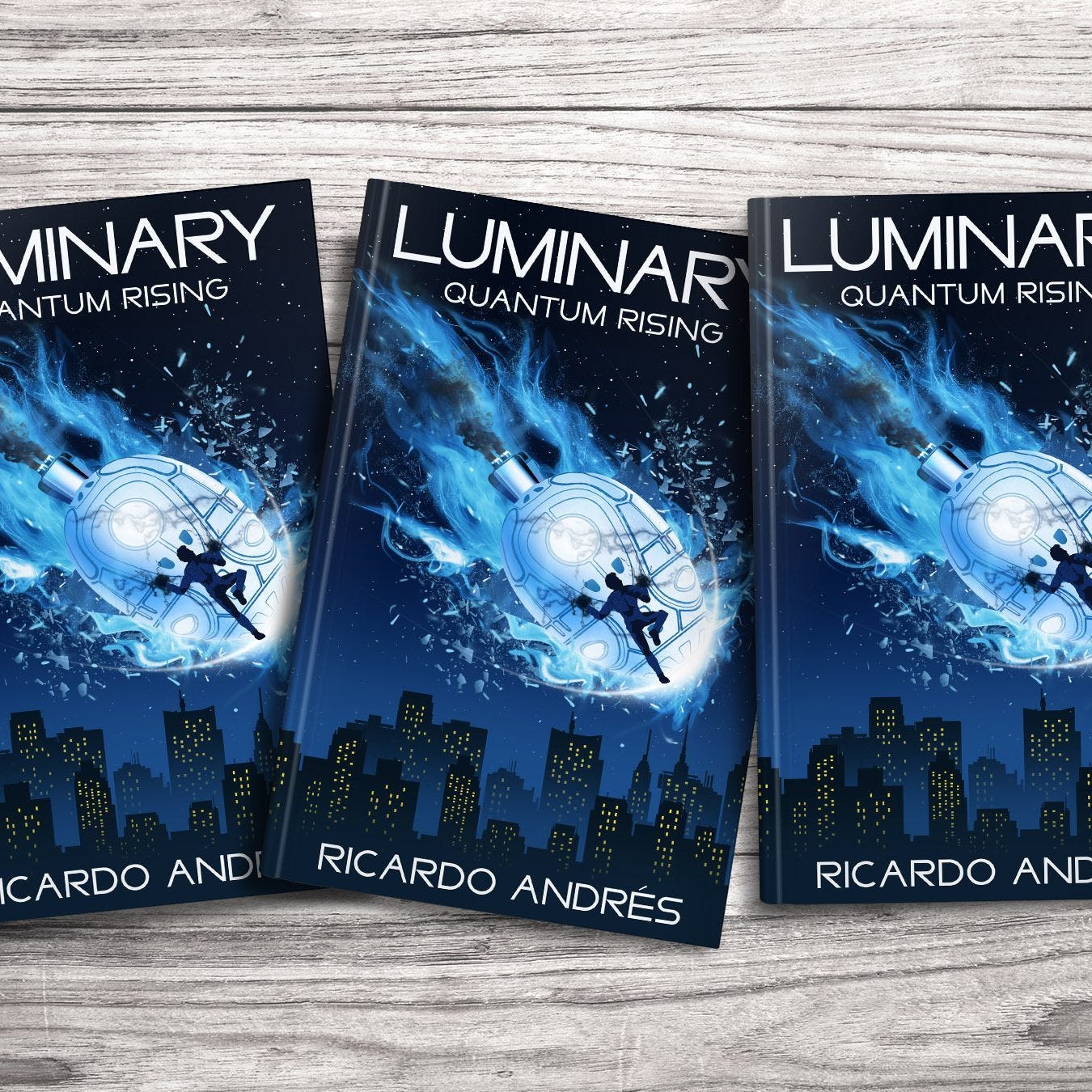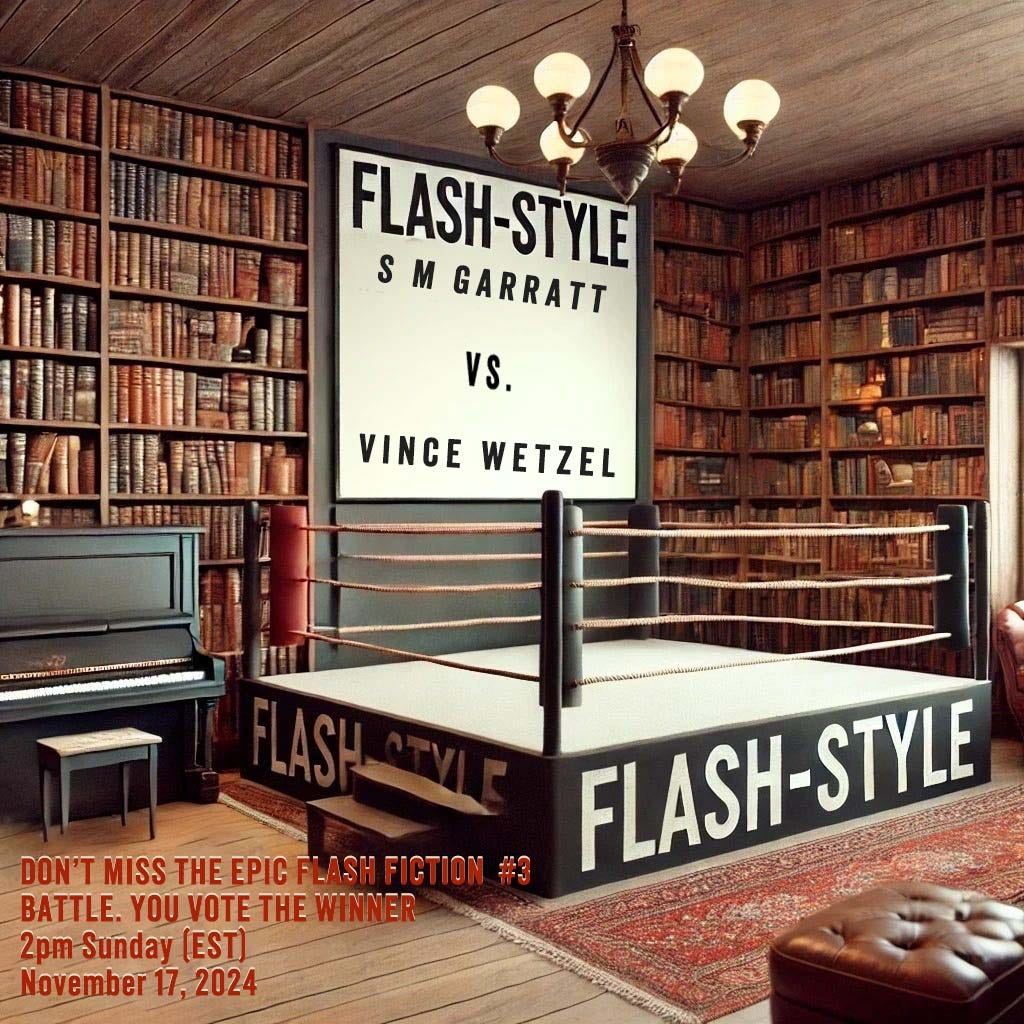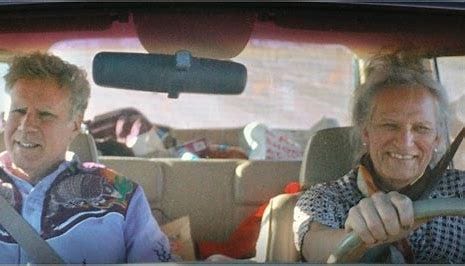[Clueless Hack On Writing] Ricardo Andres is an indie author who wrote his debut novel at 13. Recently, he moved to Dublin, Ireland to study Computer Science at the University College of Dublin. His current novel, Luminary: Quantum Rising is available. Andres, Welcome.
[Ricardo Andres] Hi Vince, thank you so much for having me!
[CHOW] You and I met at an author event at a great independent bookstore (A Seat At The Table Books) near Sacramento, CA. I was impressed by your energy and your ability to connect with your readers at a one-on-one level. What do you like about author events and meeting readers one-on-one?
[RA] Thank you for saying that! Likewise, I think the event went really well for all us authors—and I hope to do more collaborative events with you once I get back from Ireland! My favorite thing about author events is the connection that I can establish with a reader. Author events are essentially creating a community of people that revolves around you (as the author) and your ideas. With author events, you’re quite literally building your community one-by-one, and I think that there’s something really special about this.
[CHOW] I remember you sharing how your persistence helped you to have author events in five or six Barnes and Noble bookstores throughout Northern California. Tell me a bit about your process to gain access to that huge corporate brick-and-mortar seller.
[RA] That’s right, I put together a small book tour before leaving for Ireland. I’ve had events in Walnut Creek, Roseville (my home town), Sacramento, Dublin (not Ireland), and Folsom. The trickiest part about scheduling these events was finding time to call each location while I was either in school or working. My least favorite part was those event coordinators who were slow responders. I’d have to continuously follow up, which took a lot of time and effort. I think that the Roseville location took me six months before I finally got the event. I met the coordinator in person, exchanged phone calls and emails, and after a lot of patience that I felt I didn’t have, I officially got a date. There was a point in the process where it became so bad I set a weekly reminder to call them on a specific hour of a specific day. During my events, my friends and family made a huge effort to support me. My amazing girlfriend made it a regular thing to record snippets of the event and turn them into vlogs on my social media—and my mom would always volunteer to drive me to the events, even if they were in the Bay Area. If I’m going to be honest, Vince, without their support, my events wouldn’t have gone the way they did.
[CHOW] As I mentioned, you released Luminary: Quantum Rising. What is the story about?
[RA] Luminary: Quantum Rising is my debut novel, one that I started writing at 13, and finished at 18, the same year that I began my first semester of college. The novel follows a young warrior from the planet Stonit, who has the task of coming to an alien planet and protecting it against evil shape-shifters. The protagonist, Jason Wish, is assigned modern-day earth, and upon arriving, he’s suddenly given the Quantum, this mysterious and powerful energy that he doesn’t know how to use. This proves to be an interesting challenge because he’s landed on a foreign planet with a foreign ability—and he must traverse these obstacles to be successful in his job. The novel is a great fit for people who like fun, fast reads with plenty of action! The novel takes a blend of more cinematic stories, like Marvel/Star Wars, while incorporating real-world issues, like immigration.
[CHOW] I know part of your book is inspired by your mother's journey as an immigrant. What aspects of her journey from South America have informed your characters in a Sci-Fi universe?
[RA] The theme of the novel focuses heavily on immigration, specifically because the fictional country he lands on, Crain, is an “immigration dump”, where the States sends those who can’t get into the U.S. legally. Jason meets several interesting people from all parts of the world, seeking asylum in the States. Growing up, my mom told me stories of how she came to the States and worked hard to establish herself. We’re living in a really critical time in history, where immigration has been an incredibly misinformed and polarizing topic. When I wrote my novel, I felt like it was important to shine light on the human aspect of immigration—why people would leave their homes, what they sacrifice to search for a better life, how difficult it is to work tirelessly while it feels like the rest of the world is against you. Jason himself is an immigrant, and throughout the novel, he works hard to accomplish his goals despite the obstacles in his path. By taking an actual alien in outer space, and allowing him to have a similar experience from an “alien”, in residential terms, was a message that I felt could be pretty universal to the reader.
[CHOW] What is your writing process, and how does it pull you through the spaces where you are slogging through the second act?
[RA] That’s an excellent question, and one that I’ve been experimenting with since I wrote Luminary: Quantum Rising. What works for me is always writing at night. During the night time, I have a moment to myself, where I’m not studying or working. The downside is that at eleven or twelve at night, I’m pretty exhausted, and my creative juices aren’t as strong as they would be earlier in the day. A requirement whenever I write is to play music. I know that there are many people who have mixed feelings on this, but music has never distracted me from my studies or my writing. I usually listen to classical—Bach, Mozart, Beethoven—because it’s soothing and sets me in the mood—but I’ll actually put on metal or classic rock whenever I’m writing an action sequence because I can mimic the emotions conveyed through the heavier music, into my battle sequences.
[CHOW] You recently emigrated to Dublin, Ireland. What has that transition been like, both as a person and as a writer?
[RA] I’ve been in Dublin for about two months now, and I have to say that it’s been all positive. The transition was tough, as it would be for most people moving internationally. There were a lot of personal issues my family and I were going through the months and weeks before moving, and I know that that took a toll on me. But, the idea of soon moving to Ireland always kept me optimistic. Living in Dublin has been an incredible experience. The quality of life here is much higher than back in California, especially since it is much safer, even during the night time. I’m a big meat eater, and the beef and chicken is much more organic and tender, which is a big plus. And the people are incredible—the Irish specifically are super friendly and genuine people. Oh, and there are pieces of history throughout the island that are older than the States, which always fascinates me. Now as an author, experiencing new cultures, meeting new people, and learning new ideas has definitely been a positive influence on my writing.
[CHOW] My son is studying computer science in college, and it's a very demanding area of study. While you are studying in Dublin, where do you see writing in your life as you also are writing computer language?
[CHOW] I have to agree, and props to your son for pursuing computer science. It’s an incredibly taxing major, and it always keeps you on your toes. I started writing before I started programming, and I have to say that my love of languages actually influenced me to get into programming. There are several similarities in computer programming and authoring. In both fields, you have to convey a message to your audience, whether that be a computer or a reader. The exciting part is using the given language to convey that meaning, and learning about the inner workings of writing. Now, whenever I’m working on a coding project, there is a different part of my brain that’s working—separate from the author part of me. When I go to school and learn computer science, I feel like my author self is turned off until I sit down to write. It’s hard to juggle my studies (and eventually my job) with authoring—but in my mind, I see no other option. As I’m sure you can relate, Vince, most authors are not going to give up on writing, regardless how busy they get.
[CHOW] What is the most interesting piece of writing inspiration you've taken from Dublin so far?
[RA] This is a fantastic question! Since moving here, my family and I took time to tour Scotland, and we learned about the medieval history of several castles we visited. I found it fascinating that there was once a time period where kings and queens literally ruled the land, and that they had all of these formalities that you don’t see in modern politics. There was a day that we were touring Sterling Castle, in Scotland, and I kept thinking that “As a sci fi writer, I need to find a way to blend scifi with this rich, european history”. I’ve taken time to read historical fiction, a genre that I haven’t written before, and I’ve enjoyed them a lot! Specifically, I’ve read Shōgun and Tai-Pan, both by James Clavell. The stories follow the theme of Western cultures and ideas clashing with Eastern. So, to answer your question, being in Europe and learning the old history has definitely inspired me for my future projects.
[CHOW] Any new projects on the horizon?
[RA] Yes! I’m currently in the writing process of Luminary: Wrath of Darkness, the sequel to my debut novel! I’ve written this novel for almost a year now, but when I juggled marketing Quantum Rising, going to school, moving, and work—it was hard to stay focused and write something that I could be proud of. I visited Texas in the summer with my girlfriend, and while we were gone, I read my first manuscript, and was appalled with just how terrible it was! I don’t know what it was, but I knew that when I got home, I needed to do better than I had. So, now that I’ve settled in Dublin, I’ve been taking time to craft the sequel the way I always imagined it. I want readers who’ve read my first novel to go into the sequel and really experience the matured tone and the new experiences I gained since writing the first. I think that the contrast between both novels is something I’m looking forward to when readers get their hands on Wrath of Darkness.
[CHOW] Thank you so much for your time. Good luck with all of your future endeavors. You can find more about him and his writing at https://ricardo-andres.com/
Side of Mustard
Preparing for Battle
On Sunday, November 17, I’m stepping out of my comfort zone a little and participating in a Flash Fiction Battle. Hosted by
on his Substack, I’ll be pitted against from the UK. I’ll be on the Substack chat to receive my prompt at 11 a.m. West Coast Time and will be given three hours to write a 1000-word story that will be voted on at 2 p.m. Participation in the chat and voting is welcome, but you’ll need to subscribe to Andrew’s Substack to enter the chat.Why am I doing this? Why not? I joined Substack 18 months ago not only to promote my writing but to use this space to experiment and to push myself in new directions. If you can’t make the battle, I’ll post the story for your enjoyment.
Wish me luck!
Pretzel bite
Typically, I share my viewing favorites for the month during “Extra Mustard” post on the fourth Friday of the month. I have something else planned for that Friday. Plus, I think this documentary is pretty poignant.
Will and Harper (Netflix): I’m a cis gender heterosexual male and I’m still confused about transgenderism. It’s hard for me to wrap my head around what I’ve been conditioned for more than 50 years to understand. After watching Will and Harper, I’m not there yet, but I’m closer.
This documentary followed Saturday Night Live alum and movie funneyman Will Farrell on a cross-country road trip with his pal Harper Steele. Harper recently transitioned from female to male, and both have questions for each other. Questions such as? Were you nervous about talking to me after? Did you contemplate suicide? How did it feel to wake up with boobs? And what are you looking for in a relationship?
The most poignant segments of this documentary were these conversations. Funny, yet heartwarming. These were two friends getting to understand each other in this new dynamic. There were tense moments like when Harper goes into a bar in rural Iowa by herself. But she makes friends and when Will enters, everyone feels a little more comfortable. However, that strategy didn’t work as well at a Texas steakhouse when Will brings extra attention to himself dressed as Sherlock Holmes. They soon realize that the extra attention seeking isn’t welcome. It’s interesting that when Farrell made their outing more about himself than about their authentic friendship, it ends in humiliation.
Another observation: When we interact one-to-one, we are closer to humanity. when Harper was at the bar and at a dirt-track race in Iowa, people were genuinely kind. They were curious, and who knows what they felt when the cameras were off, but they were kind to her. Conversely, when we are provided distance, we are more likely to hate. In the steakhouse, Ferrell created his own distance by playing a character. People kept their distance and began filming them with their phones. When posted on social media, the trolls came out of the sludge. It was not pretty. My takeaway: Before a rush to judgment, lean into a personal interaction.
Wherever you land on your personal meter of acceptance, I recommend this documentary.







